The brave nurses at the centre of D-Day memorial
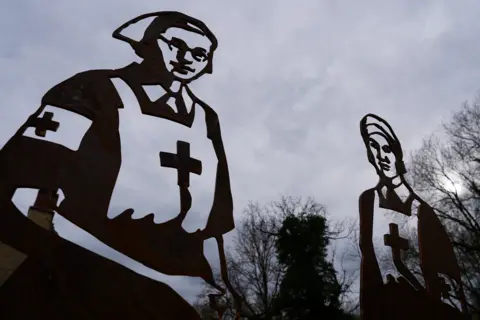 Dawid Wojtowicz
Dawid WojtowiczHigh above a Normandy beach stand 1,475 silhouettes, each representing a life lost on D-Day. At the centre are the figures of two women. Who were they and what is their story?
Of the 22,442 people under British command who died in the 12-week Battle of Normandy, just two were women.
Sister Mollie Evershed, from Soham, Cambridgeshire, and Sister Dorothy Field, of Ringwood, Hampshire, were nurses on a hospital ship when it struck a mine off the French coast.
As it went down on 7 August 1944, they helped save the lives of 75 wounded men before losing their own.
Now 8ft-high (2.5m) silhouettes of the pair stand at the centre of the Standing With Giants installation overlooking Gold Beach and marking the 80th anniversary of D-Day.
Dan Barton, who founded the project, said he was "humbled to honour them in this way".
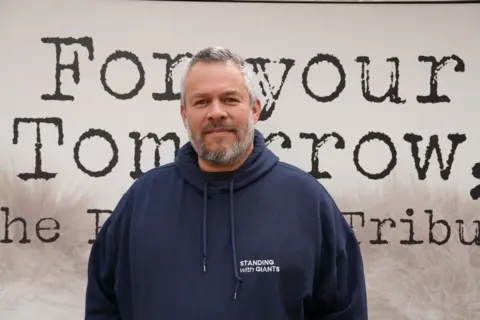 Dawid Wojtowicz
Dawid WojtowiczThe silhouettes are made from reclaimed aluminium and plastic signage often found on building sites and new housing developments.
"When people see these giant figures, they start to grieve," said Mr Barton.
"They seem to release an emotion. We call them giants because of the enormity of their sacrifice."
Most are generic silhouettes of the men who died, but Mollie and Dorothy's are based on real photographs provided by relatives.
"We wanted to do them justice, and what's incredible is that you see them in so many different ways," said Mr Barton.
"You see them one way with your eyes and another way through a camera lens, and they cast different shadows looking towards or away from the sunlight.
"They come to life and it really is quite magical."
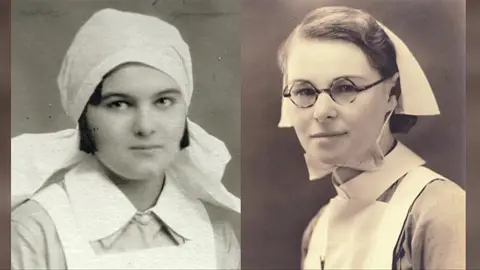 Duncan Field/Christine Cranfield
Duncan Field/Christine CranfieldAfter leaving Ely High School for Girls, Mollie trained at the Norfolk and Norwich Hospital.
Dorothy - better known by her middle name, Anyta - trained at King's College Hospital, London.
In 1944 they were serving on the SS Amsterdam. At 07:00 on a foggy morning in a heavy swell, the ship was swinging at anchor off Caen when it hit a mine.
Packed with wounded men, it was about to make its third trip back across the Channel to Southampton.
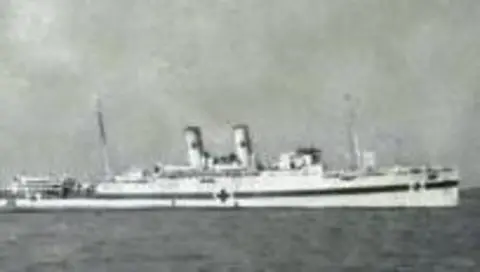 Mark McAnulty
Mark McAnultyAs the ship began to sink and with the engine room completely wrecked, Mollie and Anyta left the safety of their lifeboat and went below deck to try to save the lives of the wounded men in the wards below.
Patrick Manning worked in the galley and survived the tragedy. In 2005 he wrote an eyewitness account on the BBC's WW2 People's War pages.
"There was a heavy swell, so, finding it hard to swim in a lifejacket, I paddled," he wrote.
"I could hear a lot of screaming and shouting. I looked around and could see some of the wounded soldiers jumping over the side and there were two people stuck in portholes. I was told afterwards that they were nurses."
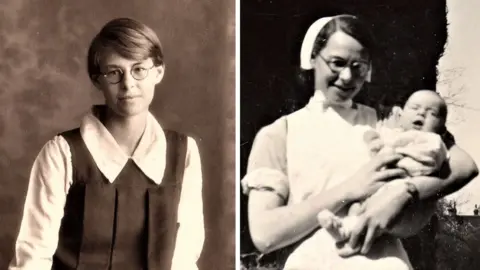 Christine Cranfield
Christine CranfieldMollie's niece Christine Cranfield is 80 and lives just a few yards away from the Soham war memorial that carries her aunt’s name.
As a baby, she was brought up by Mollie for a while until she returned to the hospital ship and met her fate.
"Nobody in the family mentioned it when I was growing up," she said.
"It just wasn't talked about. But it was Mollie's job. She obviously cared about the men to the best of her ability.
"I do hope that one day the silhouette of Mollie can come home to Soham."
Mollie died a week before her 28th birthday. She was about to be married.
Anyta was 32. Both nurses received the King’s Commendation for Bravery.
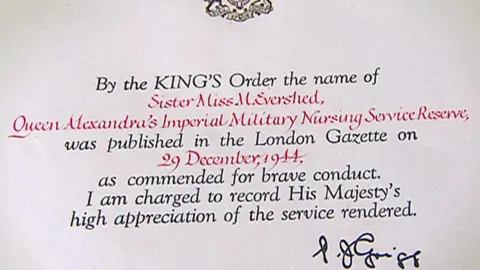 Christine Cranfield
Christine CranfieldBefore it was a hospital ship, the SS Amsterdam operated as the Harwich to Hook of Holland ferry and many of its crew were from Essex and Suffolk.
Thirty of them died that day, along with 55 patients, 11 prisoners of war, and 10 medical staff, including Mollie and Anyta.
The Standing with Giants installation will be in place behind the British Normandy War Memorial on Gold Beach until the end of August.
All but two of the silhouettes will be removed and brought home, but the figures of Mollie and Anyta will stay there for ever.
Follow Cambridgeshire news on Facebook, Instagram and X. Got a story? Email [email protected] or WhatsApp us on 0800 169 1830
